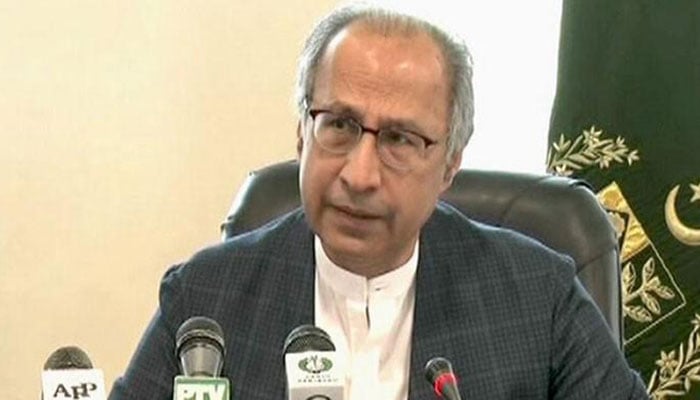New debts not for splurging, but for fulfilling international obligations: Shaikh
The government decreased its expenditure and did not undertake any new borrowing, says Hafeez Shaikh
ISLAMABAD: Adviser to the Prime Minister on Finance and Revenue Abdul Hafeez Shaikh on Saturday said the country had achieved economic stability in the first nine months of outgoing fiscal year, however, the COVID-19 pandemic has adversely affected the country's economy.
“The first nine months, we had a lot of success. In 2018, the national debt was Rs30,000 billion and during the first two months, we spent returning the loans we had,” Shaikh said while addressing the post-budget conference on Saturday.
“We paid Rs2,700 billion towards debt retirement. This was done despite our total resources for provinces standing at Rs2,000 billion,” he said.
He added that the government decreased its expenditure and did not undertake any new borrowing.
“The government also had a series of firsts, such as no borrowing from the State Bank of Pakistan, decreased imports and an increase in foreign investment of nearly 137% in the country,” he added.
The adviser added that the government did not borrow a single penny from SBP, no supplementary grant was given to any department, and current account deficit was reduced from $20 billion to $3 billion.
“But in between this the coronavirus came and affected our economy. We have suffered a loss of Rs700 billion in revenue due to the coronavirus outbreak,” Hafeez said.
He added, “Coronavirus has affected the entire world. It is not an excuse, but it is a reality and thousands have been affected. Even the IMF has said countries would be affected by it; naturally it has taken a toll on our economy as well.
”The estimated loss to the GDP due to the coronavirus is Rs3 trillion, the adviser said.
Speaking about tax collection, Shaikh said if the Federal Bureau of Revenue (FBR) had continued with its tax collection activities till the end of the year, they would have gathered Rs4,000 to 4,500 billion.
“We now have Rs3,900 billion. No one could have stopped coronavirus and because of that, businesses were shut down and there has been a loss of employment.”
“To deal with the pandemic situation in the country, a Rs1,200 billion package was announced by the government. [A significant chunk] has already been disbursed under the programme to help the needy in the country,” he remarked.
“It has reached 10 million Pakistanis. The public saw us distributing cash and giving the aid without any discrimination.”
Moreover, he added, Rs280 billion wheat was brought so that farmers could receive money.
“Government also said it would pay bills of commercial enterprises and small businesses for three months to aid in their recovery. Rs50 billion was given to the agriculture sector to lessen the fertilizer costs.”
“More than 6,000 business enterprises took benefit and relief was given to consumers for their electric bills. The government did all this when it did not have money,” he said.
“Despite the decline in prices of oil, diesel etc. worldwide, we did not raise taxes or keep the portion of the profits made but made sure it trickled down to masses,” he said, adding that the government had nine months of stability in the year and the virus was dealt with a good package.
The adviser added that moving forward, the government’s biggest concern was the repayment of the remaining Rs2,900 billion in loans.
“To do any reduction in this is out of our hands,” Shaikh said. “To give back Rs3,000 billion we have lessened government expenditure and took difficult austere measures.”
“We want to take fewer taxes but if we have to repay Rs3000 billion we have to make cuts,” he said. Shaikh added the development outlay has been set at Rs650 billion rupees while allocations for Ehsaas Program have been enhanced to protect the vulnerable segments of the society.
“We are not taking loans under this government to splurge,’ he said. “We are taking to repay our loans. Our international responsibilities have to be dispensed and despite all of this we imposed no new taxes.”
“The budget for next fiscal year is focused on coping with the impacts of COVID-19 and provide relief to the masses. The basic pillar of the budget is that no new tax has been imposed in it, rather concessions worth Rs40 to Rs50 billion have been given in taxes and duties to support industrial sector and create job opportunities.”
Giving a breakup of the relief given in taxes, the adviser said regulatory duty on 1,623 tariff lines of raw materials were being done away while on others including those related to engineering sector were also being reduced.
Shaikh added that ten different types of withholding tax was also being abolished.
“Massive relief has also been given to different sectors especially the construction. The Capital Gains Tax is being halved whilst the federal excise duty on cement has also been cut,” he said.
Shaikh added that the sales tax for the retailers opting to link themselves with the FBR was being reduced to 12%. “The duty on the hospitality sector is being reduced from 1.5% to 0.5% and taxes and duties were being abolished on coronavirus and cancer testing kits,” he added.
-
Security forces gun down 30 terrorists in multiple IBOs in KP: ISPR
-
MQM-P calls for new province in Sindh
-
US report validates Pakistan military edge over India: PM
-
Banned TTP poses serious threat to Pakistan security: UNSC panel
-
CM Afridi clarifies remarks on by-poll after ECP requests army deployment
-
Dubai sees 3.2m Pakistani passengers in 2025 as airport sets new milestone
-
Security forces kill 23 Indian proxy terrorists in KP's Kurram
-
Pakistan to construct island to boost oil exploration: report












